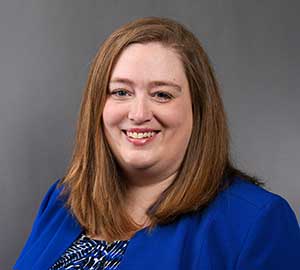Leadership: Kelley Garner, Arkansas Department of Health, on the Value of Mentorship in the HAI/AR Outbreak Response
Posted: September 30, 2021
Author: Kelley Garner, MPH
Don’t be afraid of mentorship at every level of your career – constantly surround yourself with experts in the field.
Mentorship is an important part of the public health profession and the HAI/AR outbreak response field. Not only does it guide, direct, and shape your present situation and future opportunities for the better, but it also improves the ways in which we respond to HAI/AR outbreaks. I have had numerous experiences with being both a mentor and mentee in my career. I started as an intern at the Arkansas Department of Health where I faced many challenges as the sole coordinator in the HAI Program. I was fortunate to have mentors in various roles, from diverse professional backgrounds and with a broad scope of expertise. Surrounding myself with mentors early in my career helped me improve and master both my technical and leadership skills and helped me to overcome those challenges I experienced as an intern and continues to shape a lot of my current work.
A key mentor in my career was Dr. Nate Smith, the former state health official from Arkansas, whose interest and involvement in our HAI/AR Program activities was instrumental in establishing and guiding the direction of our HAI Program. From day one, Dr. Smith invested his time in boosting my confidence, such as when he ensured I felt comfortable presenting data in front of Arkansas’s HAI/AR Advisory Committee early on in my career. He encouraged me to be creative to meet the public health needs for HAI/AR, as well as taught me to think big. Finally, Dr. Smith appreciated my input and asked questions, which allowed me to develop control measures and descriptive work to tackle an outbreak of a new species of mycobacterium within the state.
I was later hired and promoted to a supervisor, and now, the Chief of Epidemiology on HAI/AR at the Arkansas Department of Health. Throughout my career, my mentors have been “safe spaces” and part of my support system to help me excel in my roles. HAI/AR outbreak response can be complex and sometimes we encounter unique situations that may benefit from additional guidance or perspectives from others in the field. During these times, mentors are pivotal for either providing you with the information and guidance necessary or working with you through the challenge to reach a solution. For example, I recall an outbreak linked to contaminated saline bottles in a rural part of Arkansas, which required a process of documentation and analyses with limited available “written” guidance. My mentors helped me manage that outbreak and supported me through that experience.
While I’ve continued to surround myself with experts in the field who continue to serve as my mentors, I’ve also taken on roles as a mentor to others. I currently mentor college students and scholars in public health and I have formed mentor relationships with HAI Coordinators in neighboring states like Missouri and Oklahoma, where I support them in their IPC and HAI outbreak response work. Such a role has been particularly valuable because of the cross-collaboration and relationship-building this has contributed to our HAI/AR outbreak response activities. For example, we’ve invited states to participate in Infection Control Assessment and Responses, which has allowed us to get an outside perspective on Arkansas’s outbreak response and for other states to learn from our processes. Additionally, we’ve assisted states with analyzing complex data, which further expanded our state’s resources across the spectrum of HAI/AR. Finally, working with other states has created a sense of community within the infectious disease field, and has mutually instilled confidence in us as state health leaders of HAI/AR. I’m proud of the many success stories that have emerged from my mentorships.
Throughout my past and current mentorship experiences, I’ve gained insight into what makes a mentorship successful. Good mentors:
- Have similar shared experiences and starting points as their mentees, exercise transparency in sharing both successes and failures, set realistic expectations, and create a safe space for mentees to try new things within boundaries
- Help their mentees learn through experience
- Can boost confidence, foster, and instill critical leadership skills such as communication, decision-making, responding to the press, conducting patient notifications and other outbreak response skills
- Emphasize the broader impact of HAI/AR response
- Serve as inspiration for their mentee to succeed
Mentorship is a two-way street, and it’s important for both the mentor and mentee to reach a consensus on the goals for the relationship as the roles change over time. While traditional and formal mentorship opportunities through fellowships and peer-to-peer convenings such as CSTE or ASTHO can create a strong foundation to learn and build relationships, there are equally impactful mentorship experiences that can occur informally and organically, with people in various roles, and with diverse experiences, skills, and expertise.
Groups like the Council for Outbreak Response can also support mentorship in the HAI/AR outbreak community as they develop tools and resources that bridge public health and healthcare outbreak response. Mentorship in the HAI/AR outbreak field is critical and to those that are early in their career, a mentor can help you identify your priorities and manage your expectations. Find a mentor with the right personality and someone who understands where you are coming from. Also, look for mentors who are transparent and honest and give you the space to think creatively. I believe mentorships are critical at all levels and just as important. For those who have progressed in their career, don’t be afraid to embrace mentorship experiences at all levels and to continuously surround yourself with experts.
